
Pros & Cons of Portable Solar Panels Compared to Rooftop
Pros & Cons of Portable Solar Panels Compared to Rooftop
By: Kenny & Sabrina Phillips
With the long days of summer now upon us, we thought what better time to talk about installing a solar kit to your RV? This is the time of year when you can collect the most amount of rays from the sun and turn it into energy for your RV.
Why Add Solar to Your RV?
If you are familiar with Sabrina and I and how we travel, then you will know we love campgrounds and full hookups. We feel when we are settled in and all connected there is no difference between living in our RV versus when we had our small condo in Philadelphia. That being said, we also enjoy getting away - far away - where it is just the two of us and some desert. With plenty of area for Belle to roam off leash and opportunities to sit outside and stargaze at night. Solar power is definitely key for this type of RV camping.
But, even if being out in the middle of nowhere is not your thing, there are still advantages to having a solar kit. For example, at campgrounds that do not offer power or where they meter your power consumption and charge you for it. With a solar kit, you will be able to use less of their power and make your own to offset the monthly costs of the electricity bill. Plus, you won't be completely reliant on their power source. Have you ever been to a campground and had the power suddenly go out and stay out for a couple of days? We have, and with a solar kit, it's no worries at all.
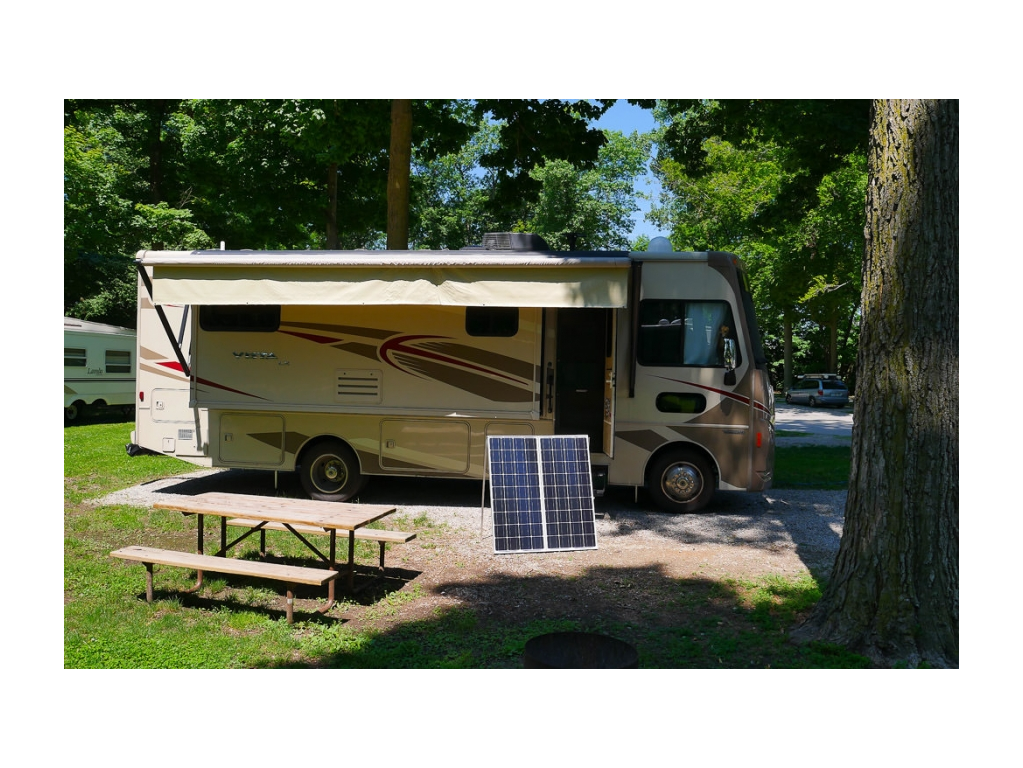
A Simple Explanation of How Solar Works
I hear people ask all the time, "What can I power in an RV with solar?" However, it doesn't exactly work like that. When you are unplugged from shore power and not using your generator, everything is being powered by your house batteries. You have some items that run directly on the power of a battery, like your interior lights or water pump. Then you have some larger items that need the power to go through your inverter first, like a blender, coffee maker, and residential refrigerator.
The larger your inverter wattage, the more powerful of an appliance you can operate. The larger your battery capacity, the longer you can run that appliance for. And the more solar panels you have, the faster you can recharge your batteries and keep them maintained.
Getting Over the Fear of a Solar Install
For some, adding solar to their RV can be very intimidating, but it doesn't need to be. There are different levels of solar installs and different configurations in which solar can be added. We have seen some people tow 18-ft trailers covered in solar panels on the outside and loaded with lithium batteries on the inside. We have also seen panels that are hinged to the side of an RV - when they park they can raise them up like an awning to collect the most from the sun while hanging out underneath in the shade. However, I am not going to go into those more complicated setups.
In this article, I'll focus on the two most popular solar power options: portable panels and rooftop panels. Portable panels can be placed on the ground with power cables that run back to the RV, while rooftop panels are permanently fixed to the roof.
So, empty your holding tanks, fill up your freshwater tank, and come along with me as I go through the pros and cons of portable solar panels compared to rooftop panels.
5 Pros of Portable Solar Panels
1. Flexibility of Where to Park
The first benefit of portable solar that comes to mind is the flexibility it allows for when parking your RV. When we purchased our portable panels, we ordered them with 25 feet of power cable, so that we would be able to park our RV in any direction. This allows us to park our RV to face the best views out of our windshield, block the wind from our campfire site, or -- even better - park the RV in the shade to keep it cool. We can basically park the RV in any place or direction and still capture the sun's rays by moving the panels out and away from the RV.
When the panels are fixed to the roof, you need to be sure to park your RV in certain directions to ensure the panels face the sun without anything blocking those rays - like shadows from your AC unit or satellite dish.
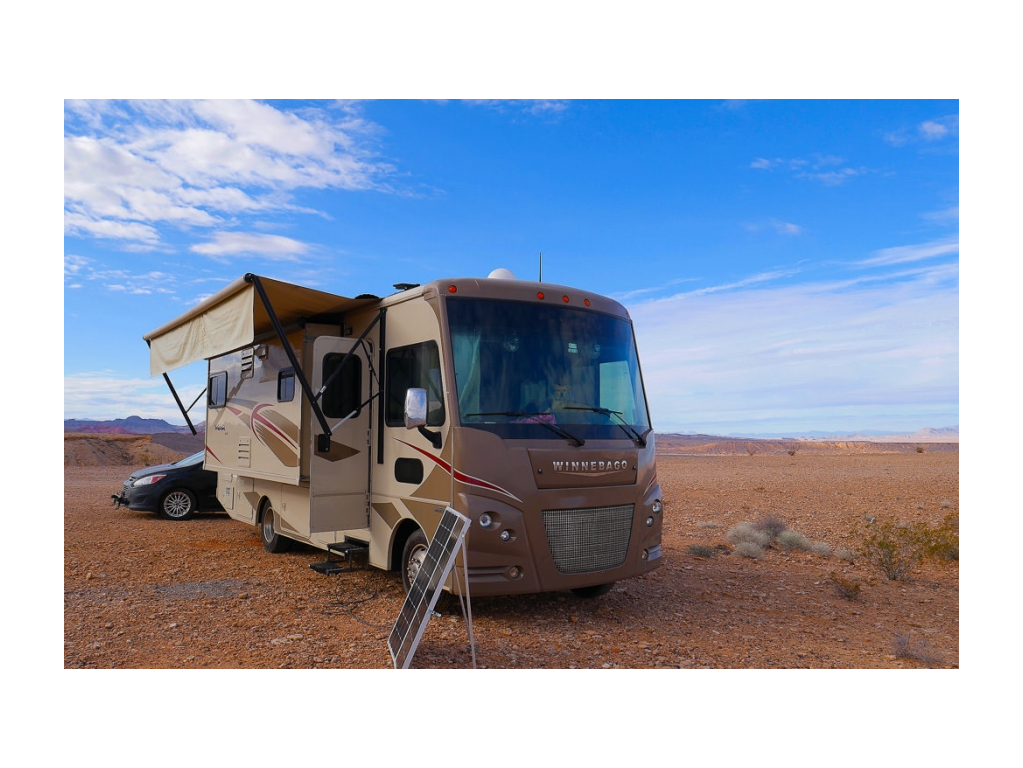
2. Easy Installation
Portable solar is extremely simple to install. In under an hour, you can have your panels starting to collect the sunshine and transferring that energy to recharge your house batteries. The only thing you need to do to start charging your batteries from the solar panels is to mount a solar charge controller somewhere near your batteries. Then it is just a couple of simple connections. (The solar panels are plugged into the solar charge controller, then the solar charge controller is plugged into the batteries). The solar charge controller does what it sounds like, it controls the amount or flow of charge going into the batteries and stops them from being overcharged, which would cause damage to them.
This might still sound a little scary. But trust me, it is very simple compared to rooftop solar panel installation. No drilling into the roof and no need to fish wires down through the roof of the RV, or anywhere else throughout the RV.
3. Get the Most Out of the Sun's Rays
With the panels down on the ground, it is easy for me to tilt them up, down, left, or right. This allows me to adjust the angle of the panel to match where the sun is in the sky, giving me the most amps per hour. Turning and tilting the panels can increase the rate of charge going to the batteries by a significant amount. For example, over the winter, we saw an increase of up to 40% more power coming in.
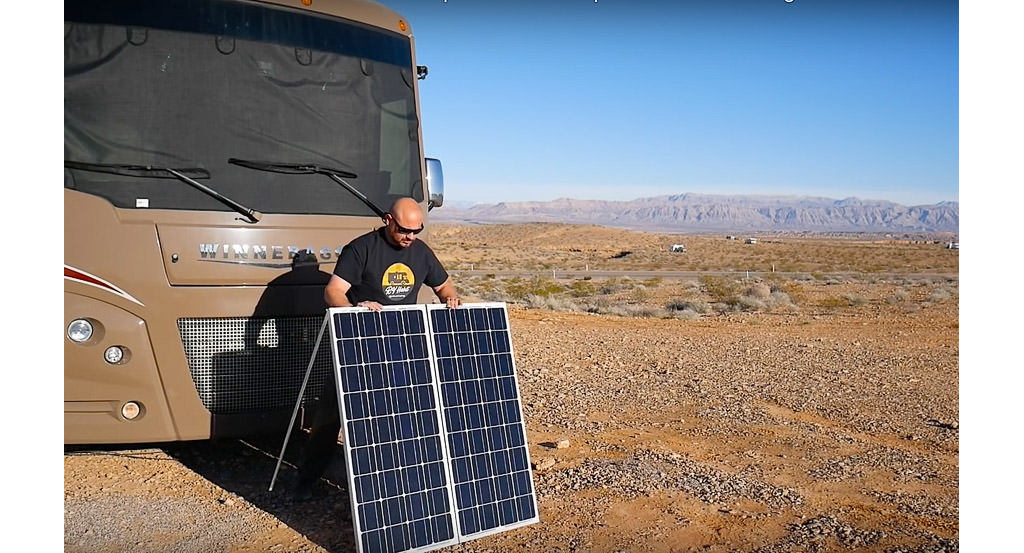
4. More Cost Effective
Adding portable solar to your RV is very reasonable when compared to rooftop, mostly because of the lack of installation. There is no need for mounting hardware and you most likely will not use more than two panels in your setup. Our 200-watt portable solar kit with cables only cost about $350.00
5. Great Beginner Step
I really feel this is the way to go for anyone who is new to solar and wants a solar setup added to their RV. It is a great first step that will allow you to see the benefits of solar at a low cost and you might be surprised that it is all you need to enjoy being off-grid for a week or two.
4 Cons of Portable Solar Panels
1. Storage Space Necessary
Portable solar will not work for you if you don't have room in your RV to store the panels. Our Winnebago Vista 27N actually has an enormous amount of storage, especially for being under 30-ft. We keep our panels under our bed since we found that to be the most secure spot for them.
A big plus for rooftop solar is that there is usually plenty of space on the roof for multiple panels to be mounted. And no need to have the storage space available.
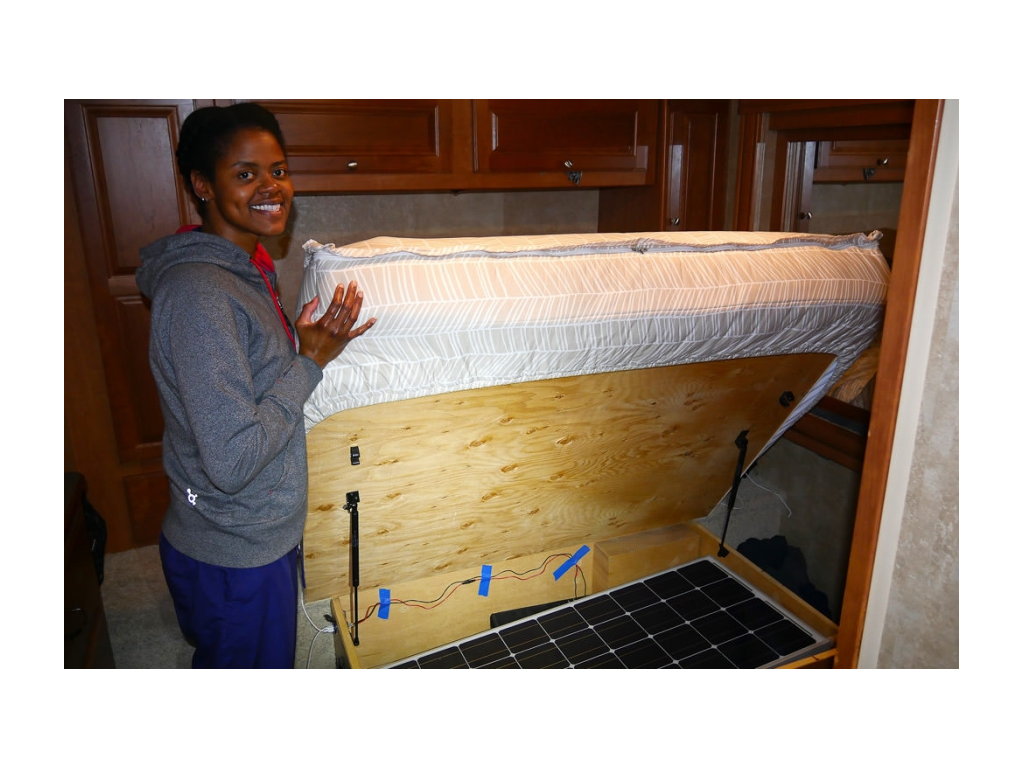
2. Need to be Parked for Panels to Work
This one may be a bit obvious, but you cannot use your portable panels on the go, whereas rooftop panels are always on and working. This becomes especially important on cross-country trips when stopping overnight at casinos, cracker barrels, and other over-night favorites. These places are nice enough to let us stay the night and we do not want to look like we are trying to move in by setting up our portable panels and trying to capture the last couple of hours of sunlight.
3. Must Set Up Portable Panels Each Time You Stop
Portable solar panels could be viewed as a hassle considering you need to set them up and break them down each time you move. However, once your rooftop panels are installed, you never touch them again except for cleaning. They would be considered a set it and forget type of system.
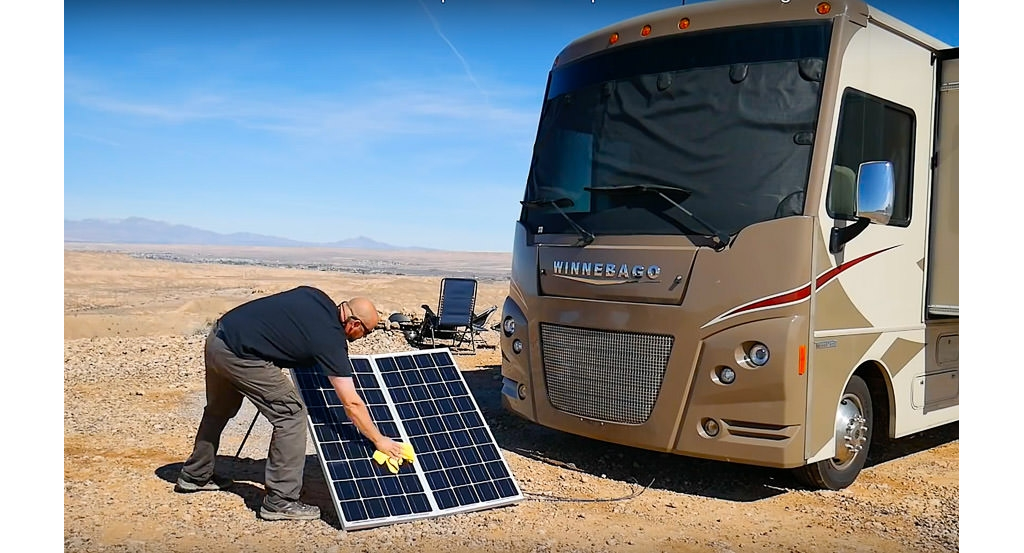
4. Protecting the Panels Can Be a Hassle
When the panels are down on the ground they are subject to damage from being pushed over by high winds or, even worse, theft. The panels are very light and are usually set up like a suitcase, making them very easy to walk off with. We have a 25-foot braided bike chain attached to ours, but it really would not be that difficult to cut through the cord if someone was determined to take them.
Closing Thoughts on Solar
As you can see, there really is no reason to be intimidated by adding some solar to your RV. You can always start out with a very simple system and expand your setup as your power demands increase. Just because you are unplugged, it doesn't mean you have to be left out in the dark. So get out there and enjoy some off-grid living!
If you have any questions, please leave them down in the comment section and we will do our best to answer them. And if you have any other pros or cons to point out, we would be interested in hearing them as well. As always, take care everyone and safe travels!
Comments
Comments on this post are moderated, so they will not appear instantly. All relevant questions and helpful notes are welcome! If you have a service inquiry or question related to your RV, please reach out to the customer care team directly using the phone numbers or contact form on this page .